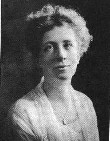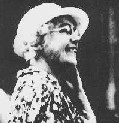
 |
Lillian Moller Gilbreth
Born: May 24, 1878 in Oakland, CA
Died: January 2, 1972 in Phoenix, AZ
|
Education
Doctor of Philosophy (1915), Brown University, Psychology
M.A. (1902), University of California at Berkeley, English Literature
B.A. (1900), University of California at Berkeley, English Literature
|
Landmarks
First woman to graduate from the University of California at Berkeley with honors
1904 Married Frank Gilbreth
1924 Frank Gilbreth's death left Lillian sole provider for their 12 children
Asked by President Hoover to join the Emergency Committee for Unemployment during the Great Depression
Created the nationwide "Share the Work" program in order to create new jobs
1935 Professor of Management at Purdue University
Military consultant to the government during World War II
|
Contributions
Lillian Gilbreth is best known for her contributions to industrial organizational psychology and ergonomics.
Some of her household inventions include the foot-pedal trashcan and refrigerator door-shelves. |
Honors
Twenty honorary degrees
1921 First female member of the Society of Industrial Engineers
Chair of the American Society of Mechanical Engineers Management division
Society of Industrial Engineers First Gilbreth Medal for Distinguished Contributions to Management
1944 Society of Mechanical Engineers and the American Management Association Gantt Gold Medal
1952 Declared by J.W. McKenney "The World's Greatest Woman Engineer"
1966 First woman to receive the Hoover Medal for Distinguished Public Service by an Engineer
Only psychologist to ever appear on a United States postage stamp
|
Key Words:
I/O psychology, ergonomics, industrial engineering, Psychology of Management, "Share the Work," productivity efficiency, Frank Gilbreth |

 |
Eleanor Jack Gibson
Born: December 7, 1910 in Peoria, IL
Died: 2002 in South Carolina
|
Education
Doctor of Philosophy (1938), Yale University, Psychology
M.A. (1933), Smith College, Psychology
B.A. (1931), Smith College, Psychology
|
Landmarks
1940 Assistant Professor at Smith College
1949 Research Associate at Cornell University
1965 Professor of Psychology at Cornell University
Professor Emeritus at Cornell University
|
Contributions
Eleanor Gibson is best known for her contributions to perception and perceptual development.
|
Honors
1968 American Psychological Association Distinguished Scientific Contribution Award for perceptual development
1969 Century Psychology Prize for "Principles of Perceptual Learning and Development"
1971 Second female psychologist elected to the National Academy of Sciences
1972 Susan Linn Sage Professor of Psychology from Cornell University
1992 National Medal of Science
President of the Eastern Psychological Association
Numerous honorary degrees from academic institutions such as the University of New York at Albany, Smith College, the University of South Carolina, and Rutgers University
|
Key Words:
"visual cliff," perceptual development, developmental psychology |

 |
Florence Laura Goodenough
Born: August 6, 1886 in Honesdale, PA
Died: April 4, 1959 in FL
|
Education
Doctor of Psychology (1924), Stanford University
M.A. (1921), Columbia University
B.S. (1920), Columbia University
B.Pd. (1908), Pennsylvania Normal School, Pedagogy |
Landmarks
Studied under Leta Stetter Hollingworth at Columbia University
1920 Director of research at the Rutherford and Perth Amboy New Jersey public schools (school psychologist)
1921 Worked with Lewis Terman at Stanford University while Terman developed the Stanford-Binet intelligence test
1924 Worked at the Minneapolis Child Guidance Clinic
1925 Listed as a contributor to Terman's book Genetic Studies of Genius
1925 Assistant Professor at the University of Minnesota
1931 Professor at the University of Minnesota
1947 Professor Emeritus at the University of Minnesota
Instructed Ruth Howard, the first African-American female to receive a Ph.D. in psychology
|
Contributions
Florence Goodenough is best known for her contributions to psychological testing and
measurement. She was among the first to criticize the Intelligence Quotient (IQ) and
to document the effects of environment on intelligence. |
Honors
President of the National Counsel of Women Psychologists
1946 President of the Society for Research in Child Development
Listed in the Watson Directory of Outstanding Contributors to Psychology
|
Key Words:
intelligence testing, Draw-a-Man test, Draw-a-Woman test, Minnesota Preschool Scale, time sampling, event sampling, nature vs. nurture |

|
Jacqueline Jarrett Goodnow
Born: November 25, 1924 in Queensland, Australia
|
Education
Doctor of Philosophy (1951), Radcliffe College, Psychology
B.A. (1944), University of Sydney |
Landmarks
1951 Honorary appointment at the University of Hong Kong
1956 Research scientist at the Walter Reed Army Institute of Hong Kong
1962 Research Associate and lecturer at George Washington University
1966 Professor at George Washington University
1972 Senior lecturer and Associate Professor at the School of Education at Macquarie University in Sydney, Australia
1976 Professor of psychology at the School of Behavioral Sciences in Macquarie University
Professor Emeritus at Macquarie University
|
Contributions
Jacqueline Goodnow is best known for her contributions to cognitive development
and the effects of learning, social, and cultural factors on cognitive psychology.
|
Honors
1989 American Psychological Association G. Stanley Hall Award for Distinguished Contributions to Developmental Psychology
1997 Society for Research in Child Development Award for Distinguished Scientific Contributions to Child Development
Honorary Doctor of Science from Macquarie University
|
Key Words:
cognitive development, concept formation, social psychology |






